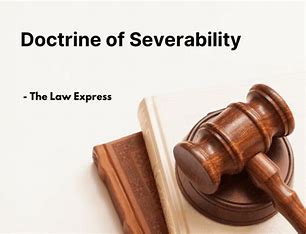Section III, or the basic rights, also became operative with the 1950 ratification of the Indian Constitution. A set of inalienable rights known as the fundamental rights ensures that every member of this nation may live a life of dignity and experience full, all-around growth.
Any law that violates these rights may be overturned by the courts. But, the issue of what to do when merely a piece of the challenged statute violates basic rights emerges, and it is in these situations that the theory of severability is used. The legitimacy of the theory is derived from Article 13, which reads, “All legislation in force in India prior to the beginning of the Constitution will be invalid to the extent to which they are inconsistent with the principles of basic rights.” According to the theory, which is an extension of Article 13, only the specific section of a legislation that violates or infringes upon a person’s basic rights and is severable from the remainder of the statute shall be deemed invalid by the courts, not the entire statute.
The court determined that Section 14 of the Preventive Detention Act violated Article 14 of the Constitution in AK Gopalan v. State of Madras. The Court continued, invalidating Section 14 will not modify the Act’s purpose; therefore, just the challenged component will be invalidated, not the entire Act. In DS Nakara v. Union of India, the same point was stated.
In State of Bombay v. FN Balsara, it was determined that the Bombay Prohibition Act, 1949’s violative sections did not impair the law’s overall legitimacy, hence the legislation did not need to be declared null and void.
“PRIME LEGAL is a full-service law firm that has won a National Award and has more than 20 years of experience in an array of sectors and practice areas. Prime legal fall into a category of best law firm, best lawyer, best family lawyer, best divorce lawyer, best divorce law firm, best criminal lawyer, best criminal law firm, best consumer lawyer, best civil lawyer.”


